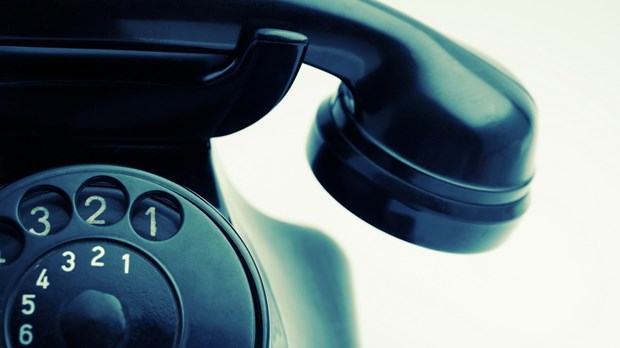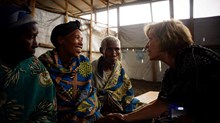When God Doesn't Answer

I was 18 the night I stopped praying for my brothers. Sean is severely autistic. Niall has Down Syndrome.
I'd tired of hurling nightly prayers for divine healing, or variations on that theme, at my bedroom ceiling: "God, the Bible says you care about healing. Please heal Sean and Niall." "God, what about our family made you think we could handle two handicapped sons?" "Is it something we've done? Not fair!" "Lord, why am I normal and Sean and Niall not? Is there something I'm supposed to do or be to make up for them?" "God, why their handicaps? Why?"
My words always seemed to bounce off the ceiling and fall flat—words that couldn't move an implacable God. God's non-answer to my "Why?" pierced me deeper than the in-my-face physical nature of my brothers' handicaps: Niall cannot feed, clean, or clothe himself. He will never talk, read, or write. Sean fares little better.
Nails Have Names
Nails—painful, difficult situations that hurt desperately and pin us down—can come in all sorts of shapes and sizes. Sean and Niall were my nails—sharp and pointed, driving home one reality: God was God and who was I to expect that he'd answer my prayers the way I needed?
Nails hurt. I'd rather pry them out, bandage the holes, and limp far away from the affront Sean and Niall represent to my understanding of God (or rather who I think God is and what his creation should be: beautiful, in order, whole).
But Sean and Niall won't let me pry them out. They are my brothers after all. My mind's eye always sees Sean's twitching fingers, hunched shoulders, and too-thin body in perpetual motion, even when he stands still. Niall's cross-eyed glances and smiles mute the script that threatens to run continually in my head: God, I guess I'll have to fix all this somehow as you can't or won't. I can't hobble away from them any more than I can from the unanswered "Why?" of those countless prayers.
Perhaps I didn't know how to listen. Perhaps my faith couldn't accept the finality of God's silence. Whatever the reason, I stopped praying for Sean and Niall's healing. Instead, I grieved God's seeming abandonment of them, of my family, of me.
Letting Go
I resumed praying for Sean and Niall 30 years after I'd stopped. It was during a session in "An Hour on Sunday," Willow Creek Canada's 2006 arts conference. Teaching pastor Nancy Beach, had just shared about the reward of Sundays for those leading or involved in worship: transformed lives.
"Are we living like Jesus would live if he were physically in our bodies? What are the places in our lives that need to be more like him?" she asked. "What do we need to let go of so that we can discover the depths of God's heart?" As her questions faded, a poignant video began to play of Bill Hybels and members of his team baptizing congregants in a lake.
In that moment, I let go of my need for God to answer my "Why?" questions about Sean and Niall. I turned off the script in my head for good. I looked away from my nails and up at the images of uplifted hands, joyful tears, water. I focused on these images of the big picture, the only picture that matters—life made new, here and now, physically, because of Jesus' death and resurrection. I prayed.
Thirty-year-old words continue to shape my prayers, but I offer them in a different spirit now: "Dear God, thank you for Sean and Niall. Be their daily bread in the ways they need you to be today." "Dear God, you are the Great Physician. Only you can heal Sean and Niall. Heal me too." "Dear God, I don't understand what great work you are doing in my family so help me to be patient."
What Nails Do
In the hands of Jesus, the master carpenter, Sean and Niall have done what only nails can do. First, they've held me and continue to hold me in that place where I identify, in a way I couldn't otherwise: with the suffering Christ who cries, "My God, my God, why have you forsaken me?" (Matthew 27:46, NIV). Jeremiah's cries and Habakkuk's poetry give me permission to lament; to not rush to the assurances that so many of our hymns and contemporary Christian songs quickly offer. Yes, I know that Jesus is coming again, that this world is not our home, and that a new heaven and earth will be reality someday. But that doesn't make injustice or grief any easier to swallow.
Second, Jesus uses my nails to change my understanding of God. Those nails keep me fastened to the heart of my heavenly Father who wants me to come to him and say: "Yes. Nothing, not even Sean and Niall, will separate me from you," and mean every word. And it's in that place too that I am slowly learning that God the Father understands my grief because he also grieves.
Finally, it is because of Sean and Niall that I am blessed: "Blessed are you who weep now, for you will laugh" (Luke 6:21, NIV). Because of them, I savor the luxury and power of being able to communicate with words that are understood. Because of them I grasp at least one aspect of God's shaping of and call on my life: as theologian Walter Brueggemann wrote, I am called to mourn "with those who know pain or suffering and lack the power or freedom to bring it to speech."
Quarrels, conversations, secrets, and belly laughs over family jokes—I will never share those experiences with Sean and Niall, at least not this side of heaven. One day though, I will.
I need nails. We all do.
Renee James is the director of communications for Canadian Baptist Women of Ontario and Quebec. She hopes to write a book one day on Luke 6:21.
Read more articles that highlight writing by Christian women at ChristianityToday.com/Women
 Read These Next
Read These Next

 Mountain MoverPatricia Raybon, author of I Told the Mountain to Move, reveals what she learned the hard way about the power of prayer.
Mountain MoverPatricia Raybon, author of I Told the Mountain to Move, reveals what she learned the hard way about the power of prayer.
 Refugee Resettlement Isn’t a Political Issue—It’s a Humanitarian IssueIn the world’s “most dangerous place for women,” the greatest fear isn’t rape or death—it’s being forgotten. My heartbreaking experience in a displacement camp for the people of Congo.
Refugee Resettlement Isn’t a Political Issue—It’s a Humanitarian IssueIn the world’s “most dangerous place for women,” the greatest fear isn’t rape or death—it’s being forgotten. My heartbreaking experience in a displacement camp for the people of Congo.








 Homepage
Homepage
